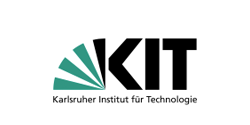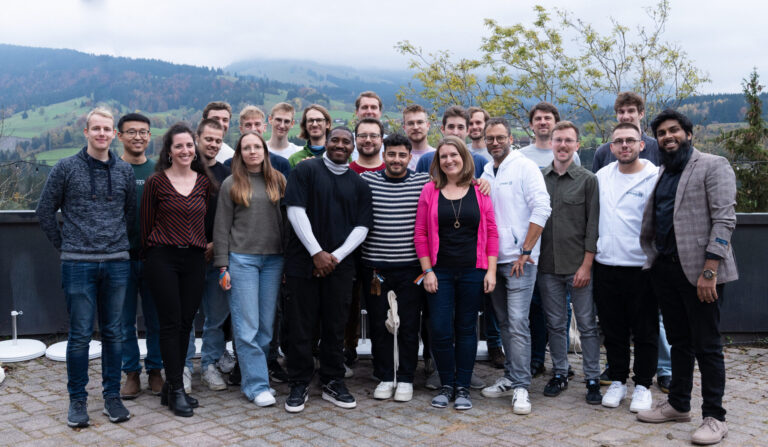We are driven by our passion for high-end software engineering. But our work extends way beyond state-of-the-art software development: we invest in research into innovative technologies and methods. Our agile, self-organised team of research scientists creates technologies that are reliably one step ahead and that lay the foundation for the future of digital innovations.

Research and innovation
XITASO is therefore your partner for the entire research and developement value chain: from applied research to the development of mature innovative products and platforms.
International scientific excellence and close dialogue with the community are integral parts of our day-to-day research. They are the mainstays of our innovative strength and the secret of our achievement.
“We are pioneers of innovative cutting-edge technologies.”

Dr. Jan-Philipp Steghöfer
Head of R&I
XITASO
Research and innovation for your success
Together with our partners from industry and science, we develop new domains and expand our expertise as part of interdisciplinary research projects:
- We conduct joint research with industry partners on practical use cases to ensure the relevance and impact of our research
- Together with research partners from science, we adapt the necessary fundamental technological and methodological knowledge to practical challenges
- We align our research with sustainable technology trends in the market, which we identify together with our customers, partner organisations and associations
Because: Together we can shift the state of the art!
Research and innovation at XITASO – learn more about our the priorities of our research projects here:

AI for industrial applications – turning limited data into real value
AI for industrial applications often grapples with unbalanced data that contains relatively few error cases, causing many AI methods to fail. Our research and innovation is geared at generalised AI solutions that can work effectively in this environment, increasing value and avoiding costly test set-ups for data harvesting. Digital innovations play a vital roll here, especially in areas such as knowledge extraction, neurosymbolic AI and contrastive learning.
AI in healthcare and medical technology – clear focus on privacy and reliability
Harnessing the full potential of AI in healthcare and medical technology will require infrastructure that prioritises data protection and trust. Our research is therefore focused on explainability, data security and the quantification of uncertainties. We embrace applied research and targeted technology development to craft solutions that people can trust and enjoy working with due to increased AI reliability.

Generative AI – trustworthy technological change
The rise of generative AI (GenAI) is transforming how we use technology and presenting fresh opportunities for digital innovation. But unanswered questions that we are determined to address still remain. AI is unable to reach judgements based on human common sense, so the trustworthiness of generated content is absolutely crucial for us and our customers. Maintaining the security of stored information is another important aspect of our research and innovation. We also investigate the impact of GenAI on XITASO’s core business, namely software development.
Autonomous systems and robotics – ensuring their reliability and ease of use
Autonomous systems and robots are increasingly integrated into our everyday lives – from delivery robots and automated trains to cars with self-driving capabilities. We conduct purposeful industrial research to investigate ways of improving the safety and efficiency of these technologies.
Our technology development underpins and expands the standards of software solutions from XITASO for autonomous systems, making them safe, reliable, scalable and user-friendly.
Cybersecurity and cryptographic agility – future-proof
Our IT systems need to remain secure going forward as well. In a connected world, developing strong protection mechanisms to shield sensitive data from new threats and make systems resistant to cyber attacks is absolutely imperative. Digital innovations are essential here, as they enable fresh approaches to secure data processing and encryption. Cryptographic agility is a vital part of this. It ensures that systems can adapt to novel encryption methods if vulnerabilities are identified in current algorithms. With our applied research, we develop practical solutions to make software systems sustainably future proof.

Industry 4.0 and data spaces – improving industry efficiency
What the Industrial Internet of Things (IoT) will bring to manufacturing and industrial processes is not just a change, but a revolution. It improves connectivity, creates digital twins of physical devices and systems and ensures the smooth data exchange along the entire supply chain. Developing data spaces encourages this change by enabling the emergence of interoperable applications and leveraging technology development and efficiency within the industry.
Learn more about our research projects and partners here:
A selection of our publications
2024
-
Measuring Similarities in Model Structure of Metaheuristic Rule Set Learners
David Pätzel, Richard Nordsieck, Jörg Hähner
EvoAPPS 2024 -
Tracking assets in source code with Security Annotations
Daniel Haak, Raphael Mayr, Jan-Philipp Steghöfer, Alexandra Teynor, Phillip Heidegger
ICSE 2024 Poster Track -
Where Requirements and Agility Meet: No Man’s Land or a Land of Opportunity?
Fabiano Dalpiaz, Jan-Philipp Steghöfer
To appear in IEEE Software
Hier lesen -
Combining Requirements Enigneering Techniques for the Analysis of a Legacy System
Jessica Friedline, Jan-Philipp Steghöfer
Joint Proceedings of REFSQ-2024 Workshops, Doctoral Symposium, Posters & Tools Track and Education and Training Track. Co-located with REFSQ 2024. Winterthur, Switzerland, April 8, 2024
PDF-Download
2023
- Contrastive pretraining of regression tasks in reliability forecasting of automotive electronics.
Emilio Zarbali, Alwin Hoffmann, Jonas Hepp
22nd International Conference on Machine Learning and Applications (ICMLA 2023), Jacksonville, Florida, USA, Dez. 2023. -
FeatRacer: Locating Features Through Assisted Traceability
Mukelabai Mukelabai, Kevin Hermann, Thorsten Berger, Jan-Philipp Steghöfer
IEEE Transactions on Software Engineering, 2023
Hier lesen -
Processes, Methods, and Tools in Model-based Engineering — A Qualitative Multiple-Case Study
Jörg Holtmann, Grischa Liebel, Jan-Philipp Steghöfer
Journal of Software and Systems, 2023
PDF-Download -
Blended modeling in commercial and open-source model-driven software engineering tools: A systematic study.
Istvan David, Malvina Latifaj, Jakob Pietron, Weixing Zhang, Federico Ciccozzi, Ivano Malavolta, Alexander Raschke, Jan-Philipp Steghöfer, Regina Hebig
Softw. Syst. Model.22(1): 415-447 (2023)
Hier lesen -
CASCADE: An Asset-driven Approach to Build Security Assurance Cases for Automotive Systems.
Mazen Mohamad, Rodi Jolak, Örjan Askerdal, Jan-Philipp Steghöfer, Riccardo Scandariato
ACM Trans. Cyber Phys. Syst. 7(1): 3:1-3:26 (2023)
Hier lesen -
Trustful Model-Based Information Exchange in Collaborative Engineering.
David Schmelter, Jan-Philipp Steghöfer, Karsten Albers, Mats Ekman, Jörg Tessmer, Raphael Weber
EuroSPI (1) 2023: 156-170
Hier lesen -
Exploiting Meta-Model Structures in the Generation of Xtext Editors.
Jörg Holtmann, Jan-Philipp Steghöfer, Weixing Zhang.
Proceedings of the 11th International Conference on Model-Based Software and Systems Engineering (MODELSWARD).
PDF-Download -
Creating Python-style Domain Specific Languages: A Semi-automated Approach and Intermediate Results.
Weixing Zhang, Regina Hebig, Jan-Philipp Steghöfer, Jörg Holtmann.
Proceedings of the 11th International Conference on Model-Based Software and Systems Engineering (MODELSWARD).
PDF-Download
-
Automated Extraction of Grammar Optimization Rule Configurations for Metamodel-Grammar Co-evolution.
Weixing Zhang, Regina Hebig, Daniel Strüber, Jan-Philipp Steghöfer
SLE 2023: 84-96
PDF-Download
2022
- Predicting thermal resistance of solder joints based on Scanning Acoustic Microscopy using Artificial Neural Networks.
Andreas Zippelius, Tobias Strobl, Maximilian Schmid, Joseph Hermann, Alwin Hoffmann, Gordon Elger.
9th Electronics System-Integration Technology Conference (ESTC 2022). - Identifying security-related requirements in regulatory documents based on cross-project classification.
Mazen Mohamad, Jan-Philipp Steghöfer, Alexander Åström, and Riccardo Scandariato.
Proceedings of the 18th International Conference on Predictive Models and Data Analytics in Software Engineering (PROMISE’22), pp. 82-91. - A Closer Look at Sum-based Embedding Aggregation for Knowledge Graphs Containing Procedural Knowledge.
Richard Nordsieck, Michael Heider, Anton Hummel, Jörg Hähner.
6th International Workshop On Deep Learning For Knowledge Graphs (DL4KG) at the 21th International Semantic Web Conference (ISWC 2022).
PDF-Download - Towards Conceptual and Procedural Models of Operator Knowledge in Industrial Information Models.
Richard Nordsieck, Anton Hummel, Michael Heider, Alwin Hoffmann, Jörg Hähner.
First International Workshop On Semantic Industrial Information Modelling (SemIIM) at the 19th Extended Semantic Web Conference (ESWC 2022).
PDF-Download - Reliability-Based Aggregation of Heterogeneous Knowledge to Assist Operators in Manufacturing.
Richard Nordsieck, Michael Heider, Alwin Hoffmann, Jörg Hähner.
2022 IEEE 16th International Conference on Semantic Computing (ICSC).
2021
- Learning Classifier Systems for Self-Explaining Socio-Technical-Systems.
Michael Heider, Richard Nordsieck, Jörg Hähner.
Proceedings of the LIFELIKE 2021 – 9th Edition in the Evolution of the Workshop Series of Autonomously Learning and Optimizing Systems (SAOS).
PDF-Download - CAD-based Grasp and Motion Planning for Process Automation in Fused Deposition Modelling.
Andreas Wiedholz, Michael Heider, Richard Nordsieck, Andreas Angerer, Simon Dietrich, Jörg Hähner.
International Conference on Informatics in Control, Automation and Robotics (ICINCO).
Link - Knowledge Extraction via Decentralized Knowledge Graph Aggregation.
Richard Nordsieck, Michael Heider, Anton Winschel, Jörg Hähner.
IEEE International Conference on Semantic Computing (ICSC).
PDF-Download
2020
- Evaluating the Effect of User-Given Guiding Attention on the Learning Process.
Richard Nordsieck, Michael Heider, Andreas Angerer, Jörg Hähner.
IEEE International Conference on Autonomic Computing and Self-Organizing Systems (ACSOS).
Link - Interactive Knowledge-Guided Learning.
Richard Nordsieck & Jörg Hähner.
IEEE International Conference on Autonomic Computing and Self-Organizing Systems Companion (ACSOS-C).
Link - Opportunities and Limitations of Mixed Reality Holograms in Industrial Robotics.
Michael Filipenko, Andreas Angerer, Alwin Hoffmann, Wolfgang Reif.
Factory of the Future: How to digitalize the robot-aided manufacturing process in Industry 4.0? Part of the 2019 IEEE/RSJ International Conference on Intelligent Robots and Systems (IROS).
PDF-Download
2019
- Towards Automated Parameter Optimization by Persisting Expert Knowledge.
Richard Nordsieck, Michael Heider, Andreas Angerer, Jörg Hähner.
International Conference on Informatics in Control, Automation and Robotics (ICINCO).
PDF-Download
2018
- partsival – Collision-based Particle and many-body Simulations on GPUs for Planetary Exploration Systems.
Roy Lichtenheldt, Simon Kerler, Andreas Angerer, Wolfgang Reif.
Joint International Conference on Multibody System Dynamics (IMSD).
PDF-Download

Are you interested in a collaboration in the field of research and innovation, or do you have questions about our projects?
Then contact our Head of Research & Innovation and find out how we can help you in a no-obligation discussion.
Dr. Jan-Philipp Steghöfer
tel. +49 821 885 882 374
jan-philipp.steghoefer@xitaso.com















